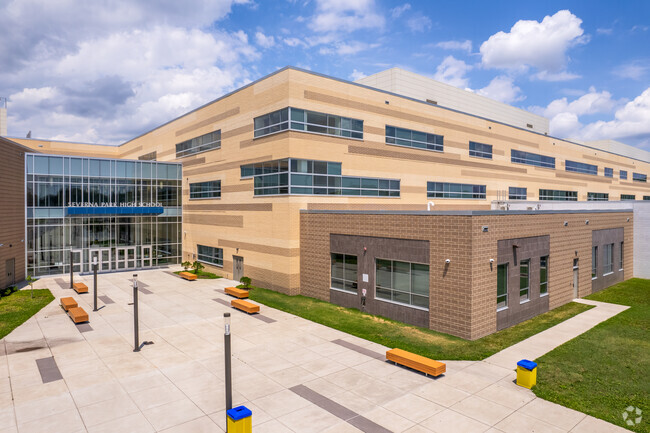Discover the Benefits of Advocacy: Save Temecula Schools
Discover the Benefits of Advocacy: Save Temecula Schools
Blog Article
How Schools Play a Crucial Role in Shaping Future Leaders and Innovators
Colleges contribute in forming future leaders and innovators through the farming of critical reasoning, imagination, and partnership. By integrating project-based understanding and interdisciplinary researches, instructional institutions test trainees to evaluate and synthesize intricate information. Teachers serve as coaches, guiding pupils and nurturing their potential, while after-school activities better establish management abilities and durability. This dynamic environment not only concentrates on specific toughness however also emphasizes the relevance of teamwork, vital for browsing tomorrow's challenges. Exactly how precisely do these aspects interaction to develop a durable structure for future success?
Fostering Essential Assuming
In today's swiftly developing globe, cultivating essential believing within universities has ended up being paramount. As culture faces progressively complex global difficulties, the capability to examine, review, and synthesize info is essential. Institutions play a vital role in developing these skills, preparing students to browse and attend to diverse issues with educated, reasoned choices.
To cultivate vital thinking, educators use various instructional methods that encourage active knowing and intellectual engagement. Class discussions, problem-based discovering, and Socratic examining are critical in advertising analytical and reflective thought procedures. By challenging trainees to question assumptions and think about several perspectives, these methods ensure a deeper understanding of topic beyond memorizing memorization.
Additionally, integrating critical thinking across the educational program enhances its value and applicability in diverse contexts. Subjects such as mathematics, science, history, and literary works each offer special opportunities to establish trainees' important faculties. Evaluating historic events requires comprehending and reviewing resources context, while clinical inquiry demands extensive theory testing and evidence-based reasoning.
Inevitably, instilling important assuming skills in trainees outfits them with the cognitive tools needed for lifelong learning and flexibility. It is via this foundational skills that future leaders will be able to innovate, solve issues, and contribute meaningfully to society.
Motivating Creative Thinking
Welcoming creativity within academic frameworks galvanizes trainees to assume past conventional borders and discover cutting-edge solutions. By incorporating artistic ventures and creative reasoning exercises into the curriculum, institutions grow a setting where originality and imaginative thought are valued. This technique not only improves the academic experience but likewise gears up trainees with the capability to deal with real-world obstacles in unique methods.
Educational institutions can promote imagination through varied ways such as project-based discovering, interdisciplinary studies, and the consolidation of arts and technology. Project-based knowing, as an example, encourages students to apply their knowledge in practical, often joint, projects that require creative problem-solving abilities. Interdisciplinary research studies allow students to draw links in between various topics, thus expanding their point of views and boosting their imaginative capacities.
Furthermore, supplying pupils with chances to involve with emerging technologies, such as coding and electronic style, better supports their creative potential. These tasks motivate students to experiment, fall short, and iterate, which are essential components of the innovative process (Save Temecula Schools). By preserving a helpful setting where testing is urged, colleges can ensure that pupils create the confidence to go after cutting-edge ideas
Basically, nurturing creative thinking in educational settings is indispensable for shaping future leaders and pioneers qualified of addressing complex worldwide issues with ingenuity.
Supporting Collaboration

Implementing group-based learning components and participating projects permits pupils to experience the characteristics of team effort firsthand. This not just prepares them for the joint nature of modern-day work environments however likewise nurtures leadership qualities as they commonly need to handle roles such as job supervisors or team coordinators. In addition, cooperation in the classroom can break down social obstacles and advertise inclusivity, making certain that each pupil really feels valued and heard.
Additionally, incorporating innovation can better support collective efforts. Tools like common interactive platforms and digital offices enable trainees to collaborate successfully, even outside the class. As trainees create these collaborative skills, they are much better outfitted to deal with complicated obstacles and innovate, preparing for their future roles as innovators and leaders.
Function of Educators as Mentors

Mentorship entails tailored attention, where teachers recognize and support individual strengths and address weak points. Save Temecula Schools. Via one-on-one communications, teachers can tailor their recommendations and assistance to satisfy each trainee's special requirements, fostering a sense of self-confidence and durability. This individualized approach grows a growth mindset, urging pupils to view failures as chances for finding out and development
Furthermore, teachers act as function designs, showing the worths of stability, compassion, and willpower. Their mindsets and actions offer a blueprint for students to emulate, instilling a sense of ethical duty and social recognition. By developing a encouraging and comprehensive class environment, instructors allow students to develop interpersonal skills that are critical for reliable management.
Essentially, the mentorship supplied by educators lays a fundamental framework for the development of future leaders, outfitting them with the expertise, skills, and values needed to master an ever-evolving world.
Influence of After-school Activities
When integrated effectively into the academic structure, extracurricular activities dramatically enhance trainee growth and leadership capacity. These tasks offer trainees with possibilities to check out passions beyond the traditional curriculum, promoting a well-rounded skill collection.
Pupils engaged in songs, dramatization, or debate clubs find out to think critically and approach problems from varied Website perspectives. By working together with peers learn this here now from various histories, pupils additionally create compassion and interaction skills, crucial qualities for future leaders.
Extracurricular activities additionally play an important duty in scholastic efficiency. Research study indicates that students associated with such programs often tend to have greater qualities and better attendance documents. These tasks offer a healthy and balanced electrical outlet for stress and anxiety, adding to general wellness. Hence, colleges that focus on a well balanced approach to education, integrating robust extracurricular programs, are more probable to produce trendsetters and leaders furnished to satisfy the obstacles of the future.

Verdict
To conclude, institutions considerably form future leaders and pioneers by supporting crucial reasoning, creative thinking, and cooperation among trainees. Involving pedagogical strategies such as project-based discovering and interdisciplinary researches play a vital duty in this advancement. Educators, serving as mentors, give important support and support, while extracurricular tasks further enhance management prospective and durability. By cultivating a supportive setting that values specific toughness and teamwork, colleges gear up trainees with the required abilities to navigate future challenges and drive development.
As students establish these collaborative skills, they are much better outfitted to tackle complex obstacles and introduce, laying the groundwork for their future roles as leaders and innovators.
By promoting vital thinking and analytic skills, instructors help students navigate complicated challenges, preparing them for management roles in various fields.
By teaming up with peers from different histories, students additionally establish empathy and communication abilities, necessary attributes for future leaders.
In conclusion, colleges substantially shape future leaders and innovators by supporting vital thinking, imagination, and partnership among trainees. By promoting a supportive setting that values specific toughness and team effort, colleges outfit trainees with the essential skills to browse future challenges and drive technology.
Report this page